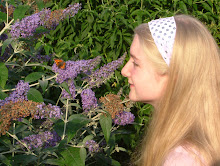I find this cartoon of a rhino on Kristin Cashore's wonderful blog This Is My Secret almost unbearable to look at or think about. It makes me really sad for the rhino and frustrated that I can't help it, despite the beauty and humour of the cartoon. So yeah, I'll cry about a cartoon rhino desperately trying to become a unicorn :( And that is why I cope with the world through dreams and pretend dragon-slaying.
The other picture makes me laugh though :)
'The Poison Garden' by Sarah Singleton is fabulous. And I don't just mean that in the sense of 'good', I mean that it's story-licious. It's like stepping through worlds I never want to leave. Dammit, I want a magical garden where I can grow plants that make perfumes and live forever in the real world, so that beautiful red rose won't wilt and those daisies will stay fresh. 'The Poison Garden' is a bit untidy in places but the plot is enjoyable enough to keep me reading despite the slightly odd pacing. Plus I love any books which revolve around the intricacies of old-fashioned pharmacology or magic. I feel this is comparable in style to 'Jonathan Strange and Mr Norrell' by Susannah Clarke, though less dark and adult in tone.
'The Poison Garden' is about a young boy called Thomas whose grandmother dies, leaving him a mysterious box that lets him into a magical garden. He discovers that she was part of a group called the Guild of Medical Alchemists who all have their own pocket-dimension gardens and that one of them poisoned his grandmother, as well as being told he is to inherit the power to remake his own garden as he wishes.
I may just have been being dense, but it took me quite a while before I realised that 'The Poison Garden' was set in the nineteenth century, but it has such a lovely nostalgic feel that it didn't seem out of place when I did realise. A label at the beginning wouldn't go amiss, however. The subject matter probably struck an extra chord with me because I have fond memories of playing in my grandmother's garden, which she spent a lot of time caring for before she had to move into a bungalow due to her health. Singleton gives you mental gardens to play in and you feel the joy in discovering them that (I hope) she felt in creating them. She manages to bring across so much individuality in each garden: I suspect everyone would choose a different one as a favourite. My mum would love Albion, as it's near the sea, whereas I would enjoy Nineveh a lot. That's actually one of the pities about this book - Singleton is more concerned with the story than the setting, which is admirable, but we barely get to explore the gardens at all. I would love to have seen more of them, especially the ones near the end, and have a few choice details explained (like who the lady in Nineveh was - I always assumed Hegel was gay from the way he talked about Karsch). Thomas is quite likeable but his female counterpart, Maude, is darned creepy, as he acknowledges in his narrative. It's weird therefore, that she ends up being presented as suddenly less creepy and more well-adjusted than expected. There doesn't seem to be a character arc there, more a character shift to provide him with an ally of his own age. But the adults in the Guild of Medical Alchemists are nicely-drawn characters and the idea that one of them is a killer adds a nice level of suspicion about their motives. Unfortunately the killer is a bit of a late addition to the story and the traitor is a pretty obvious choice, which means we don't end up having to question our assumptions about any of the Guild members. It also feels a bit of a cop-out when an extra party is added halfway through a story and is very obviously the killer, ruining the carefully-wrought tension and suspicion that had been built up.
Essentially, this book could have done with being two books in which Singleton could fully flesh out the characters and magical gardens. It would also allow her to dwell more on the main character's years in the pharmacy of Dr Constantine, which I found highly interesting, as well as developing Dr Constantine's character and maybe spending more time getting to know Mrs Lawrence and Miss Hudson, who feel a bit underdeveloped. Still, it's highly enjoyable, well-written and terribly imaginative, reminiscent of classic Diana Wynne-Jones. Recommended, if you like magical tales of weird and wonderful dreamscapes.
Subscribe to:
Post Comments (Atom)

No comments:
Post a Comment